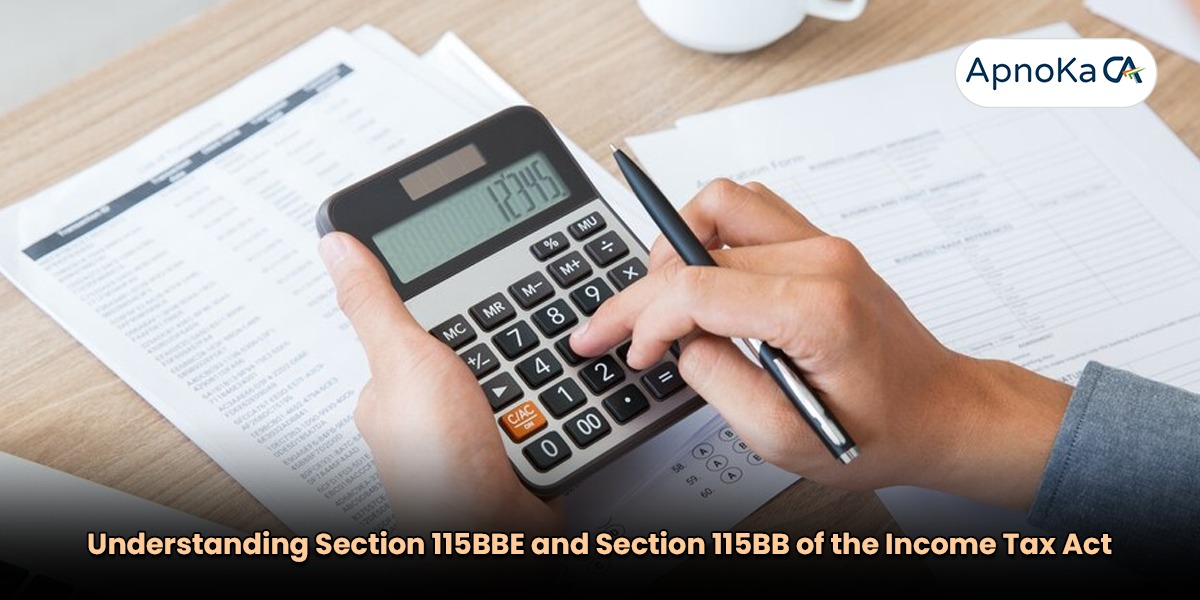# incometaxact
12 posts in `incometaxact` tag

Detailed Comparison of Section 115BBE and Section 115BB of the Income Tax Act
The Indian Income Tax Act includes specific provisions for different types of income, notably Sections 115BBE and 115BB. Section 115BBE targets unexplained income and aims to curb tax evasion by imposing a higher tax rate, while Section 115BB deals with winnings from lotteries, game shows, and similar sources. This blog provides a detailed comparison of these sections, highlighting their objectives, applicability, tax rates, and the consequences for taxpayers. Understanding these sections is crucial for ensuring compliance and avoiding penalties.

Notice Under Income Tax Act Section 143(1)(a): All the Information You Need
Receiving a notice under Section 143(1)(a) of the Income Tax Act can be daunting. This comprehensive guide explains why such notices are issued, the types of adjustments they may include, and the detailed steps to respond effectively. By understanding these aspects and maintaining accurate records, you can ensure compliance and avoid further complications with your income tax return.

Understanding Penalties under Sections 271A and 271 of the Income Tax Act
This blog provides a comprehensive overview of Sections 271A and 271 of the Income Tax Act, highlighting their key differences, penalties, and implications for taxpayers. It emphasizes the importance of maintaining proper financial records and complying with all tax-related legal requirements to avoid hefty penalties.

Sections 269SS and 269T of the Income Tax Act
The Income Tax Act has provisions called Sections 269SS and 269T that limit cash transactions for loans and deposits over Rs. 20,000 in an attempt to prevent tax evasion and encourage transparency. Such amounts cannot be accepted in cash according to Section 269SS, and cash repayment is limited according to Section 269T. Penalties for noncompliance may equal the cost of the transaction. This blog offers a thorough explanation of each of these areas, as well as helpful advice on how to comply.

A Complete Guide to Form 10BBB for Notified Pension Funds
Form 10BBB is essential for notified Pension Funds to report their investments and claim tax exemptions under section 10(23FE) of the Income-tax Act. This blog provides a detailed guide on the purpose of Form 10BBB, who needs to file it, the contents required, and a step-by-step process for filing. It emphasizes the importance of accurate and timely submission to maintain the tax-exempt status of the Pension Fund. Avoid common mistakes and ensure compliance to benefit from the exemptions and contribute to infrastructure growth.

Responding to a Notice Under Section 133(6) of the Income Tax Act
This blog provides comprehensive guidance on how taxpayers can effectively respond to notices issued under Section 133(6) of the Income Tax Act. It covers the scenarios in which these notices are issued, the type of information that may be requested, and best practices for ensuring compliance to avoid penalties and legal consequences.

Section 142(1) of the Income Tax Act
Section 142(1) of the Income Tax Act empowers the Assessing Officer to issue notices to taxpayers in certain situations to obtain more information or clarification before completing the tax assessment. This blog provides a comprehensive understanding of Section 142(1), including when the AO can issue a notice, the information that can be sought, the consequences of non-compliance, and the steps taxpayers should take to respond effectively. It also highlights the safeguards in place to prevent misuse and ensure fairness in the tax assessment process. By understanding their rights and obligations under Section 142(1), taxpayers can navigate the tax assessment process more effectively and avoid potential penalties.

Mastering Depreciation Calculation on WDV Under the Income Tax Act
In this comprehensive guide, we delve into the intricacies of calculating depreciation on the Written Down Value (WDV) of a block of assets under the Income Tax Act. Depreciation is a key component of financial management, representing the gradual wear and tear of assets over time. This blog explores the essential elements involved in WDV depreciation calculation, including the initial cost of assets, residual value, useful life, and prescribed depreciation rates. Through practical examples and step-by-step explanations, we equip taxpayers with the knowledge needed for accurate financial reporting and tax compliance. Understanding how to calculate depreciation correctly ensures businesses can effectively manage their asset values and adhere to tax regulations

Tax Benefits for Co-Operative Societies Under Section 80P
This blog delves into Section 80P of the Income Tax Act, explaining its significance for co-operative societies in India. It provides a comprehensive understanding of what a co-operative society is, the eligibility criteria for tax deductions under Section 80P, and the various types of incomes that qualify for these deductions. The article highlights the importance of these tax benefits in supporting the financial sustainability and growth of co-operative societies, particularly in rural areas, and underscores their role in promoting economic development and financial inclusion

Understanding TDS: Sections 192-206CA
Tax Deduction at Source (TDS) is a key mechanism in the Income Tax Act, 1961, to collect tax at the source of income generation. This guide covers the detailed provisions under Sections 192 to 206CA, including TDS on salary, interest, dividends, professional fees, and payments to non-residents. It explains the rates, thresholds, and procedures for deductors, along with the consequences of non-compliance. The guide also highlights the importance of obtaining a TAN, issuing TDS certificates, and filing returns.
.jpg)
Understanding TDS on Salary under Section 192 of the Income Tax Act
In this detailed blog, we explore the concept of Tax Deducted at Source (TDS) on salary under Section 192 of the Income Tax Act. We cover the applicability of Section 192, how employers estimate and deduct TDS, and the exemptions and deductions available to employees. The blog also provides a step-by-step guide to calculating TDS, highlights the compliance responsibilities of employers, and discusses the role of employees in ensuring accurate TDS deduction. Practical scenarios and examples help illustrate the process, ensuring a comprehensive understanding of this critical aspect of income tax.

CBDT Exempts RBI from Higher TDS Deduction under Section 206AB of Income Tax Act, 1961: A Comprehensive Analysis
This article explains the recent exemption of the Reserve Bank of India from higher TDS and TCS rates under sections 206CCA and 206AB of the Income Tax Act, 1961. It provides an understanding of the sections and their implications for the RBI and the Indian economy.
